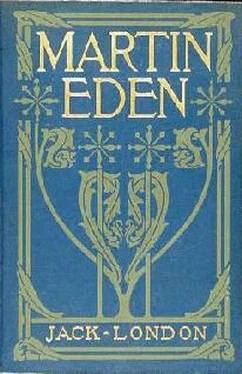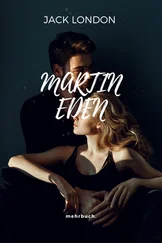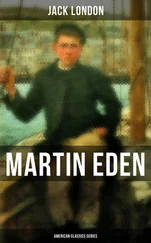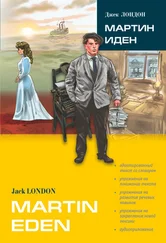"I am sorry," said Mr. Ends, "but I paid the printer not an hour ago, and he took my ready change. It was careless of me to be so short; but the bill was not yet due, and the printer’s request, as a favor, to make an immediate advance, was quite unexpected."
Both men looked expectantly at Mr. White, but that gentleman laughed and shrugged his shoulders. His conscience was clean at any rate. He had come into the Transcontinental to learn magazine-literature, instead of which he had principally learned finance. The Transcontinental owed him four months’ salary, and he knew that the printer must be appeased before the associate editor.
"It’s rather absurd, Mr. Eden, to have caught us in this shape," Mr. Ford preambled airily. "All carelessness, I assure you. But I’ll tell you what we’ll do. We’ll mail you a check the first thing in the morning. You have Mr. Eden’s address, haven’t you, Mr. Ends?"
Yes, Mr. Ends had the address, and the check would be mailed the first thing in the morning. Martin’s knowledge of banks and checks was hazy, but he could see no reason why they should not give him the check on this day just as well as on the next.
"Then it is understood, Mr. Eden, that we’ll mail you the check to-morrow?" Mr. Ford said.
"I need the money to-day," Martin answered stolidly.
"The unfortunate circumstances-if you had chanced here any other day," Mr. Ford began suavely, only to be interrupted by Mr. Ends, whose cranky eyes justified themselves in his shortness of temper.
"Mr. Ford has already explained the situation," he said with asperity. "And so have I. The check will be mailed-"
"I also have explained," Martin broke in, "and I have explained that I want the money to-day."
He had felt his pulse quicken a trifle at the business manager’s brusqueness, and upon him he kept an alert eye, for it was in that gentleman’s trousers pocket that he divined the Transcontinental’s ready cash was reposing.
"It is too bad-" Mr. Ford began.
But at that moment, with an impatient movement, Mr. Ends turned as if about to leave the room. At the same instant Martin sprang for him, clutching him by the throat with one hand in such fashion that Mr. Ends’ snow-white beard, still maintaining its immaculate trimness, pointed ceilingward at an angle of forty-five degrees. To the horror of Mr. White and Mr. Ford, they saw their business manager shaken like an Astrakhan rug.
"Dig up, you venerable discourager of rising young talent!" Martin exhorted. "Dig up, or I’ll shake it out of you, even if it’s all in nickels." Then, to the two affrighted onlookers: "Keep away! If you interfere, somebody’s liable to get hurt."
Mr. Ends was choking, and it was not until the grip on his throat was eased that he was able to signify his acquiescence in the digging-up programme. All together, after repeated digs, its trousers pocket yielded four dollars and fifteen cents.
"Inside out with it," Martin commanded.
An additional ten cents fell out. Martin counted the result of his raid a second time to make sure.
"You next!" he shouted at Mr. Ford. "I want seventy-five cents more."
Mr. Ford did not wait, but ransacked his pockets, with the result of sixty cents.
"Sure that is all?" Martin demanded menacingly, possessing himself of it. "What have you got in your vest pockets?"
In token of his good faith, Mr. Ford turned two of his pockets inside out. A strip of cardboard fell to the floor from one of them. He recovered it and was in the act of returning it, when Martin cried:-
"What’s that?-A ferry ticket? Here, give it to me. It’s worth ten cents. I’ll credit you with it. I’ve now got four dollars and ninety-five cents, including the ticket. Five cents is still due me."
He looked fiercely at Mr. White, and found that fragile creature in the act of handing him a nickel.
"Thank you," Martin said, addressing them collectively. "I wish you a good day."
"Robber!" Mr. Ends snarled after him.
"Sneak– thief!" Martin retorted, slamming the door as he passed out.
Martin was elated-so elated that when he recollected that The Hornet owed him fifteen dollars for "The Peri and the Pearl," he decided forthwith to go and collect it. But The Hornet was run by a set of clean-shaven, strapping young men, frank buccaneers who robbed everything and everybody, not excepting one another. After some breakage of the office furniture, the editor (an ex-college athlete), ably assisted by the business manager, an advertising agent, and the porter, succeeded in removing Martin from the office and in accelerating, by initial impulse, his descent of the first flight of stairs.
"Come again, Mr. Eden; glad to see you any time," they laughed down at him from the landing above.
Martin grinned as he picked himself up.
"Phew!" he murmured back. "The Transcontinental crowd were nanny-goats, but you fellows are a lot of prize-fighters."
More laughter greeted this.
"I must say, Mr. Eden," the editor of The Hornet called down, "that for a poet you can go some yourself. Where did you learn that right cross-if I may ask?"
"Where you learned that half-Nelson," Martin answered. "Anyway, you’re going to have a black eye."
"I hope your neck doesn’t stiffen up," the editor wished solicitously: "What do you say we all go out and have a drink on it-not the neck, of course, but the little rough-house?"
"I’ll go you if I lose," Martin accepted.
And robbers and robbed drank together, amicably agreeing that the battle was to the strong, and that the fifteen dollars for "The Peri and the Pearl" belonged by right to The Hornet’s editorial staff.
Arthur remained at the gate while Ruth climbed Maria’s front steps. She heard the rapid click of the type-writer, and when Martin let her in, found him on the last page of a manuscript. She had come to make certain whether or not he would be at their table for Thanksgiving dinner; but before she could broach the subject Martin plunged into the one with which he was full.
"Here, let me read you this," he cried, separating the carbon copies and running the pages of manuscript into shape. "It’s my latest, and different from anything I’ve done. It is so altogether different that I am almost afraid of it, and yet I’ve a sneaking idea it is good. You be judge. It’s an Hawaiian story. I’ve called it ‘Wiki-wiki.’"
His face was bright with the creative glow, though she shivered in the cold room and had been struck by the coldness of his hands at greeting. She listened closely while he read, and though he from time to time had seen only disapprobation in her face, at the close he asked:-
"Frankly, what do you think of it?"
"I– I don’t know," she, answered. "Will it-do you think it will sell?"
"I’m afraid not," was the confession. "It’s too strong for the magazines. But it’s true, on my word it’s true."
"But why do you persist in writing such things when you know they won’t sell?" she went on inexorably. "The reason for your writing is to make a living, isn’t it?"
"Yes, that’s right; but the miserable story got away with me. I couldn’t help writing it. It demanded to be written."
"But that character, that Wiki-Wiki, why do you make him talk so roughly? Surely it will offend your readers, and surely that is why the editors are justified in refusing your work."
"Because the real Wiki-Wiki would have talked that way."
"But it is not good taste."
"It is life," he replied bluntly. "It is real. It is true. And I must write life as I see it."
She made no answer, and for an awkward moment they sat silent. It was because he loved her that he did not quite understand her, and she could not understand him because he was so large that he bulked beyond her horizon.
Читать дальше












